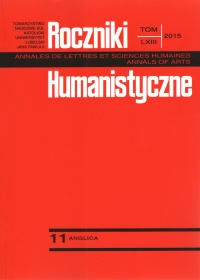Entrepreneurial training in translator and interpreter education
Abstrakt
Trening przedsiębiorczości w edukacji przekładowcy i tłumacza
Próba powiązania koncepcji dydaktyki translacji z potrzebami kształcenia odpowiadającymi wymaganiom rynku usług tłumaczeniowych oraz potrzebom rozwojowym samych studentów stanowi jeden z wiodących wątków toczącej się obecnie dyskusji w obszarze akademickiego kształcenia tłumaczy. Debata ta trwa już od ćwierćwiecza i wydaje się, że nadal będzie podejmowana przez teoretyków i praktyków dydaktyki translacji. Jednym z aspektów tak pojętej edukacji są cechy i umiejętności określane mianem przedsiębiorczości. Niniejszy artykuł ma na celu promowanie skutecznej operacjonalizacji pojęcia przedsiębiorczości tak, by absolwenci studiów tłumaczeniowych (i innych związanych z komunikacją specjalistyczną) nie tylko potrafili znaleźć pracę, ale by – przede wszystkim – stawali się podmiotami swoich znaczących działań życiowych.
Bibliografia
Chomsky, Noam. 1965. Aspects of the Theory of Syntax. Cambridge, MA: MIT Press.
EMT. 2009. Competences for Professional Translators, Experts in Multilingual and Multimedia Communication. http://ec.europa.eu/dgs/translation/programmes/emt/index_en.htm [LR: 10.09.2015].
Eraut, Michael. 2000. “Non-formal Learning and Tacit Knowledge in Professional Work.” British Journal of Educational Psychology 70: 113–136.
Gergen, Kenneth. 1985. “The Social Constructionist Movement in Modern Psychology.” American Psychologist 40 (3): 266–275.
Gergen, Kenneth. 2007. “Relativism, Religion, and Relational Being.” Common Knowledge 13 (2–3): 362–378.
Gergen, Kenneth. 2009. Relational Being. Beyond Self and Community. Oxford, New York: Oxford University Press.
Glasersfeld, Ernst von. 2007. “An Exposition of Constructivism:_Why Some Like It Radical.” Available at: http://www.oikos.org/constructivism.htm LR_28.10.2014.
Gouadec, Daniel. 2007. Translation as a Profession. Amsterdam, Philadelphia: John Benjamins Publishing.
Grucza, Franciszek. 1997. “Języki ludzkie a wyrażenia językowe, wiedza a informacja, mózg a umysł ludzki.” In Franciszek Grucza, Maria Dakowska (eds.). Podejścia kognitywne w lingwistyce, translatoryce i glottodydaktyce, 7–21. Warszawa: Wydawnictwo Uniwersytetu Warszawskiego.
Grucza, Franciszek. 2009. “Metanaukowa i metalingwistyczna wizja lingwistyki (stosowanej).” Lingwistyka Stosowana / Applied Linguistics / Angewandte Linguistik 1: 19–39.
Hase, Stewart, Chris Kenyon. 2000. “From Andragogy to Heutagogy.” Available at: http://pandora. nla.gov.au/nph-wb/20010220130000/http://ultibase.rmit.edu.au/Articles/dec00/hase2.htm LR 28.10.2014.
Hase, Stewart, Chris Kenyon. 2007. “Heutagogy: A Child of Complexity Theory.” Complicity: An_International Journal of Complexity and Education 4(1): 111–118.
Jarvis, Peter. 2012. “It Is the Person Who Learns.” In David Aspin, Judith Chapman, and Karen Evans, Richard Bagnall (eds.). Second International Handbook of Lifelong Learning. Vol. 1, 103–111. Dordrecht: Springer.
Kelly, Dorothy. 2005. A Handbook for Translator Trainers. A Guide to Reflective Practice. Manchester: St. Jerome.
Kiraly, Donald. 2000. A Social Constructivist Approach to Translator Education. Empowerment from Theory to Practice. Manchester: St. Jerome Publishing.
Kiraly, Donald. 2012. “Growing a Project-Based Translation Pedagogy: A Fractal Perspective.” META 57 (1): 82–95.
Kiraly, Donald. 2013b. “Towards a View of Translator Competence as an Emergent Phenomenon: Thinking Outside the Box(es) in Translator Education.” In Donald Kiraly, Silvia Hansen-Schirra, and Karin Maksymski (eds.). New Prospects and Perspectives for Educating Language Mediators, 197–223. Tübingen: Gunter Narr Verlag. (Translationswissenschaft 10).
Klimkowska, Katarzyna. 2013. Orientacja na sukces zawodowy studentów kończących studia translatorskie. Lublin: Wydawnictwo Uniwersytetu Marii Curie-Skłodowskiej.
Klimkowska, Katarzyna. 2014. “Entrepreneurial Potential of the Students of Applied Linguistics Programme, Majoring in Translation.” Academic Journal of Modern Philology 3: 17-26.
Klimkowski, Konrad. 2010. “Non-Formal Elements in Academic Translator Education.” In Barbara Lewandowska-Tomaszczyk, and Marcel Thelen (eds.). Translation and Meaning. Part 10, 211–220. Maastricht: Hogeschool Zuyd, Maastricht School of Translation and Interpreting.
Klimkowski, Konrad. 2012. “Elementy pozaformalne w akademickim kształceniu tłumaczy.” Roczniki Humanistyczne KUL 60 (5): 147–159.
Klimkowski, Konrad. 2015a. Towards a Shared Curriculum in Translator and Interpreter Education. Wrocław-Washington DC: Wydawnictwo WSF we Wrocławiu, PAN o. we Wrocławiu, International Communicology Institute.
Klimkowski, Konrad. 2015b. “Specjalista językowy jako przedsiębiorca: implikacje edukacyjne.” In Magalena Sowa, Maria Mocarz-Kleindienst, and Urszula Czyżewska (eds.). Nauczanie języków obcych na potrzeby rynku pracy, 163–174. Lublin: Wydawnictwo KUL.
Nord, Christiane. 1996. “Wer nimmt denn mal den ersten Satz? Überlegungen zu neuen Arbeitsformen im Übersetzungsunterricht.” In Angelika Lauer, Heidrun Gerzymisch-Arbogast, Johann Haller, and Erich Steiner (eds.). Translationwissenschaft im Umbruch. Festschrift für Wolfram Wilss, 313–327. Tübingen: Gunter Narr Verlag.
PACTE. 1998. “La competencia traductora y su aprendizaje: objetivos, hipótesis y metodología de un proyecto de investigación.” Poster, IV Congrés Internacional sobre Traducció. Bellatera (Barcelona): Universitat Autònoma de Barcelona.
PACTE. 2003. Building a Translation Competence Model.” In Fabio Alves (ed.). Triangulating Translation. Perspectives in Process Oriented Research, 43–66. Amsterdam, Philadelphia: John Benjamins Publishing..
PACTE. 2014. “First results of PACTE group's experimental research on translation competence acquisition: The acquisition of declarative knowledge of translation.” In Ricardo Muñoz Martin (ed.). Minding Translation = Con la traddución en mente. MonTI Special Issue 1. 85-115.
Pym, Anthony.2003. “Redefining Translation Competence in an Electronic Age. In Defence of a Minimalist Approach.” META 48/4: 481−497.
Pym, Anthony. 2013. “Translation Skill-Sets in a Machine-Translation Age.” META 58 (3): 487–503.
Schön, David. [1983] 2002. “From Technical Rationality to Reflection-in-Action.” In Roger Harrison, Fiona Reeve, Ann Hanson, and Julia Clarke (eds.). Supporting Lifelong Learning. Vol. 1: Perspectives on Learning, 40–61. London, New York: Routledge Falmer [originally published as a chapter in The Re-flexive Practitioner: How Professionals Think in Action; 21–69].
Vienne, Jeanne. 2000. Which Competences Should We Teach to Future Translators, and How? In Christina Schäffner, and Beverly Adab (eds.). Developing Translation Competence, 91–100. Amsterdam, Philadelphia: John Benjamins Publishing Company.
Copyright (c) 2015 Roczniki Humanistyczne

Utwór dostępny jest na licencji Creative Commons Uznanie autorstwa – Użycie niekomercyjne – Bez utworów zależnych 4.0 Międzynarodowe.





